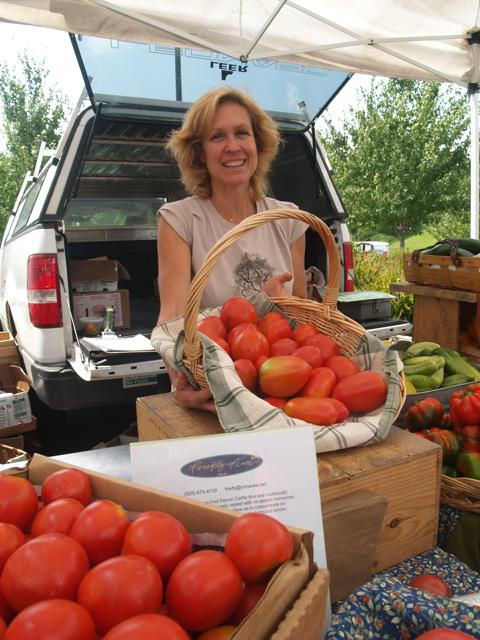- Basket of beauties: Elizabeth Gibbs of Firefly Farms takes a quick break from helping customers at the Montford Farmers Market to show us their summer bounty. Photos courtesy of ASAP
- ElizabethScott: Scott Paquin and Elizabeth Gibbs of Firefly Farm have been farming for 10 years. Paquin says he left a 25-year career in woodworking to grow healthy foods for healthy minds.
Scott Paquin and Elizabeth Gibbs used to grow 600 tomato plants a year on their farm in Yancey County. “We’ve dropped down to only 500,” Paquin says with a hint of sarcasm. They certainly have their hands full; Firefly Farm grows more than 30 varieties of vegetables. Along with apples, blueberries, cherries, peaches and pears, they raise a herd of Devon cattle to offer 100 percent grass-fed beef. But dropping their tomato plants to 500 wasn’t a selfish move. It meant that all the plants could be grown exclusively in high tunnels, or unheated greenhouses, which helps market farmers extend their growing season and combat disease. Those tunnels are a huge help to area tomato lovers.
The tunnels allow for earlier planting, Paquin says. They also help regulate watering, especially during ripening. “Regulated watering allows for more concentrated flavor and a high percentage of quality fruit,” she says. Not only does the system help Firefly get tomatoes to market early in the season, it ensures that tomatoes will still be available for a while to come, as Gibbs assured her shoppers at a Montford Farmers Market in mid-August.
This year, the couple is growing 10 different types of tomatoes, all of which are heirloom varieties. One favorite is the beloved Cherokee Purple because of “its dusky red appearance and smoky sweet flavor,” Paquin says, but the couple doesn’t stop with the standards. This year, they’ve been experimenting with the somewhat lesser-known Granny Cantrell, a variety perfect for eating fresh, slicing or canning. The verdict? The Granny Cantrell will make the permanent list for next year.
Some of the farm’s other unique testers haven’t fared as well. Matt’s Wild Cherry, a tiny variety only 1/2-inch to 5/8-inch in diameter, was more trouble than it was worth. “It took what seemed like forever to pick a pint,” Paquin says. “But even worse was discovering that if they weren’t picked with the stem on they would crack right before your eyes.” They also tried their hands at growing Calabash tomatoes only to find they ushered in late blight — a serious crop disease — and risked carrying it to their other varieties.
Both Paquin and Gibbs fully understand that farming is trial and error. They’ve been making necessary adjustments and changes for the past 10 years — but they feel like it’s all worth it. “I transitioned to organic farming after a 25-year career in woodworking because I wanted to grow healthy food to feed the minds of people in hopes that with a better diet they could make better decisions,” Paquin says.
And that’s just what they’re doing. They’ve successfully narrowed down their crops to what works and sells; the fruit trees they established years ago are beginning to yield, and they’re increasing the size of their Devon cow herd to keep up with customer demand.
Finding Firefly
You can buy Firefly Farms products directly from the farm (pre-orders only) and at the Montford Farmers Market (Wednesdays, 2 to 6 p.m.), Asheville City Market (Saturdays, 8 a.m. until 1 p.m.) and, occasionally, the Yancey County Farmers Market (Saturdays 8:30 a.m. until 12:30 p.m.). They also offer a CSA farm-share program and provide Early Girl Eatery, Tupelo Honey Cafe, Table and more Asheville restaurants with their produce.
Several years ago they also began offering on-farm dinners; their last was held on July 23. “Our goal with the dinners is to keep things as local as possible,” Paquin says. “This year, the menu kept evolving right up until the last minute.” Next year, they hope to have a dinner in late May or early June, and they’re working to develop more events.
Also in the works is the completion of their new barn, a possible root/storage cellar, and the installation of two wind turbines that will help offset the farm’s annual energy bill by 50 percent or more. A grant for the turbines was awarded by the NC Green Business Fund, which is part of the NC Department of Commerce; 10 alternative energy grant projects were funded in total. Firefly will monitor power output for one year and share the information with the public, which, Paquin notes, keeps with the philosophy of their farm.
They also plan to continue working with Appalachian Sustainable Agriculture Project. Over the course of their time farming, Firefly has utilized the organization’s business planning and marketing support to become an Appalachian Grown (TM) certified farm. When you see the Appalachian Grown logo, know you’re directly supporting family farms, strengthening the local economy and preserving rural culture. Firefly has also contributed to ASAP benefit events, including the recent benefit dinner at Knife and Fork in Spruce Pine. “We’ve felt for a long time that the more support ASAP receives from its farmers, the stronger the organization becomes,” Paquin notes.
What’s next for them at markets? By the time you read this, butternut squash and late summer fare will be piled up high at Firefly’s booths. In September, they share that their popular candy roaster winter squash will arrive.
Winter tomatoes?
Dreading the days without local tomatoes? Firefly wants to keep you in tomatoes all winter long! They’re currently offering paste tomatoes by the box, approximately 10 pounds, for sauces. Bulk quantities are offered at a special rate. To learn more about the farm and their products, call 675-4739, email firefly@mtnarea.net, or visit fireflyfarmnc.com. You can also find more information about Firefly, along with listings of more producers and tailgate markets, in ASAP’s Local Food Guide, online at buyappalachian.org.
— Maggie Cramer is the communications coordinator at Appalachian Sustainable Agriculture Project (asapconnections.org). Contact her at maggie@asapconnections.org.






Before you comment
The comments section is here to provide a platform for civil dialogue on the issues we face together as a local community. Xpress is committed to offering this platform for all voices, but when the tone of the discussion gets nasty or strays off topic, we believe many people choose not to participate. Xpress editors are determined to moderate comments to ensure a constructive interchange is maintained. All comments judged not to be in keeping with the spirit of civil discourse will be removed and repeat violators will be banned. See here for our terms of service. Thank you for being part of this effort to promote respectful discussion.